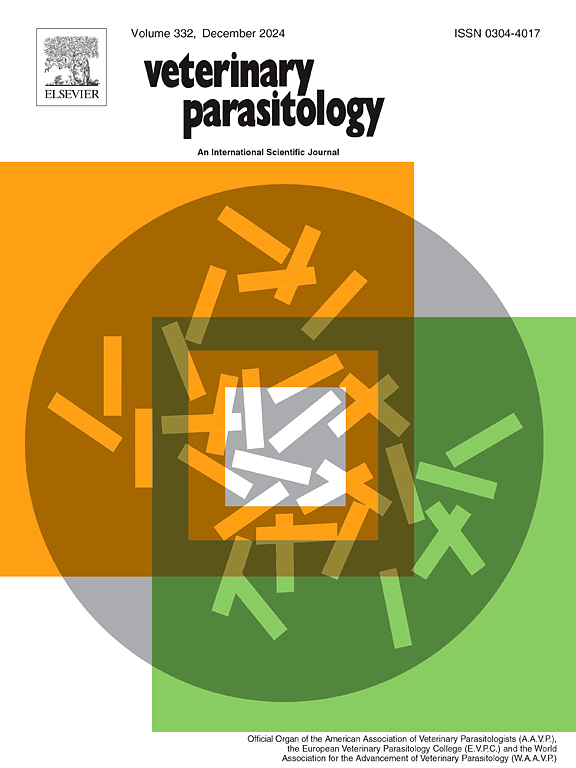富层状蛋白藻提取物对肉仔鸡盲肠菌群组成、白细胞计数、寄生虫特异性免疫反应和生长速率的影响
IF 2
2区 农林科学
Q2 PARASITOLOGY
引用次数: 0
摘要
球虫病是由艾美耳球虫属原生动物寄生虫引起的感染,是世界范围内家禽养殖的一个主要问题。该疾病目前由球虫药和活疫苗控制,但这些方法是不可持续的。因此,确定新的方法来控制感染和/或改善其对肠道健康的有害影响是很重要的。Laminarin是一种在褐藻中发现的β-葡聚糖,具有益生元和生物活性,可能有利于球虫病的控制。本研究旨在研究层粘连蛋白作为一种免疫刺激和微生物调节化合物在感染了腱状芽胞杆菌的肉鸡体内的潜力。在19日龄时,连续饲喂在第一次饲料中添加富含层状蛋白的藻类提取物(AE)的饲粮,随后感染tenella e。在实验期间监测感染结果,包括盲肠菌群和一些免疫参数。结果表明,与对照组相比,AE的添加影响了部分淋巴细胞亚群,血液中TCRγ/δ+CD8-、b细胞和CD4-CD8αβ+细胞数量增加,CD4+CD8αα+细胞数量减少,CD4-CD8α α+脾脏细胞比例增加。AE饮食不影响寄生虫排泄,病变评分或E. tenella特异性t细胞反应。然而,与对照组相比,AE喂养的鸡的盲肠微生物群中,E. tenella诱导的双歧杆菌科的收缩和梭菌科的扩张有所减少。由此可见,添加AE饲料可诱导鸡产生一定的免疫刺激活性,并影响了E. tenella感染引起的盲肠菌群的改变。本文章由计算机程序翻译,如有差异,请以英文原文为准。
Effects of a laminarin-rich algal extract on caecal microbiota composition, leukocyte counts, parasite specific immune responses and growth rate during Eimeria tenella infection of broiler chickens
Coccidiosis, infection with protozoan parasites of genus Eimeria, is a major problem in poultry husbandry world-wide. The disease is currently managed by coccidiostats and live vaccines, but these approaches are not sustainable. Hence, it is important to identify new means to control the infection and/or ameliorate its detrimental effects on gut health. Laminarin, a β-glucan found in marine brown algae, has prebiotic and bioactive properties that could be beneficial in coccidiosis control. The present study aimed to examine the potential of laminarin as an immunostimulatory and microbiota-regulatory compound in broiler chickens infected with E. tenella. Chickens were continuously fed a diet supplemented with a laminarin-rich algal extract (AE) from first feed and subsequently infected with E. tenella at 19 days old. The outcome of infection including caecal microbiota and some immune parameters were monitored during the experiment. Results showed that AE supplementation affected some lymphocyte subpopulations, with increased numbers of TCRγ/δ+CD8-, B-cells and CD4-CD8αβ+ cells and lower numbers of CD4+CD8αα+ cells in blood and increased proportions of CD4-CD8αβ+ spleen cells compared to those in control chickens. The AE diet did not affect parasite excretion, lesion scores or E. tenella specific T-cell responses. However, reductions of E. tenella induced contraction of Bifidobacteriaceae and expansion of Clostridiaceae in caecal microbiota were observed for AE fed chickens compared to chickens fed the control diet. Thus, AE feed supplementation induced some immunostimulatory activity in chickens and affected some of the alterations in caecal microbiota evoked by E. tenella infection.
求助全文
通过发布文献求助,成功后即可免费获取论文全文。
去求助
来源期刊

Veterinary parasitology
农林科学-寄生虫学
CiteScore
5.30
自引率
7.70%
发文量
126
审稿时长
36 days
期刊介绍:
The journal Veterinary Parasitology has an open access mirror journal,Veterinary Parasitology: X, sharing the same aims and scope, editorial team, submission system and rigorous peer review.
This journal is concerned with those aspects of helminthology, protozoology and entomology which are of interest to animal health investigators, veterinary practitioners and others with a special interest in parasitology. Papers of the highest quality dealing with all aspects of disease prevention, pathology, treatment, epidemiology, and control of parasites in all domesticated animals, fall within the scope of the journal. Papers of geographically limited (local) interest which are not of interest to an international audience will not be accepted. Authors who submit papers based on local data will need to indicate why their paper is relevant to a broader readership.
Parasitological studies on laboratory animals fall within the scope of the journal only if they provide a reasonably close model of a disease of domestic animals. Additionally the journal will consider papers relating to wildlife species where they may act as disease reservoirs to domestic animals, or as a zoonotic reservoir. Case studies considered to be unique or of specific interest to the journal, will also be considered on occasions at the Editors'' discretion. Papers dealing exclusively with the taxonomy of parasites do not fall within the scope of the journal.
 求助内容:
求助内容: 应助结果提醒方式:
应助结果提醒方式:


